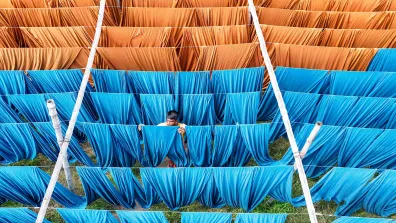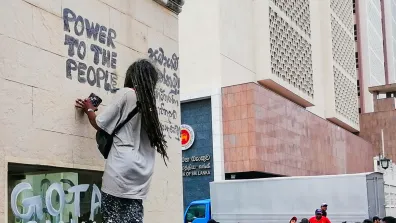Sri Lanka’s garment workers: paying a high price for cheap clothes

I met Disna at the union headquarters close to one of Sri Lanka’s many free trade zones. The two-storey building sits along a narrow pot-holed path, lined with coconut trees and humming with mosquitoes.
She was already there when I arrived: sitting carefully holding her bandaged fingers with her left hand. Disna has been a garment worker in factories since she was 16. There were few options for paid work in her village.
On the day of her accident, her boss told her she was not to take her usual place at the sewing machine. Instead, she was ordered to operate the notoriously dangerous button machine: a large steel contraption which operates by rapidly punching buttons onto clothing.
Everyone knew the risks of operating the machine: there was no safety equipment. Disna refused at first but was told if she wanted to keep her job, she’d have to work the machine.
Slowly and deliberately she set to work. Soon after, she stopped to check whether a button was properly attached. Without warning the machine punched down, crushing her hand. Disna collapsed in pain.
It took her fellow workers some time to free her from the tangle of wires that lay on the floor around her work station. Today, Disna keeps her arm tightly bandaged, and is in constant pain. She completely lost the use of her right hand and arm, and the extensive nerve damage gives her permanent migraines.
In what should be a straightforward case, the factory and brand are refusing to offer compensation. Disna’s case is one of many.
Sri Lanka is a signatory to the International Labour Organisation (ILO) conventions which require all workers to have the right to organise unions in their workplaces. Yet despite the rhetoric from local and foreign clothing brands on their commitment to workers’ rights, the stark reality for women like Disna remains long hours, poverty pay and scant regard for safety.
Most of Sri Lanka’s garment factories are located within the country’s free trade zones. Here security is tight and intent on keeping workers insulated from the influence of trade unions, and so learning about their rights enshrined in national and international law.
Disna would be alone, with ongoing medical expenses and no support, if it were not for the union fighting her corner and taking her case to court.
The ongoing work of War on Want partner Free Trade Zones & General Services Employees Union (FTZ&GSEU) has been vital in raising awareness of workers’ rights.
Thanks to training, garment workers are now refusing to accept unsafe working conditions or abuse by their bosses: together they are fighting back.


